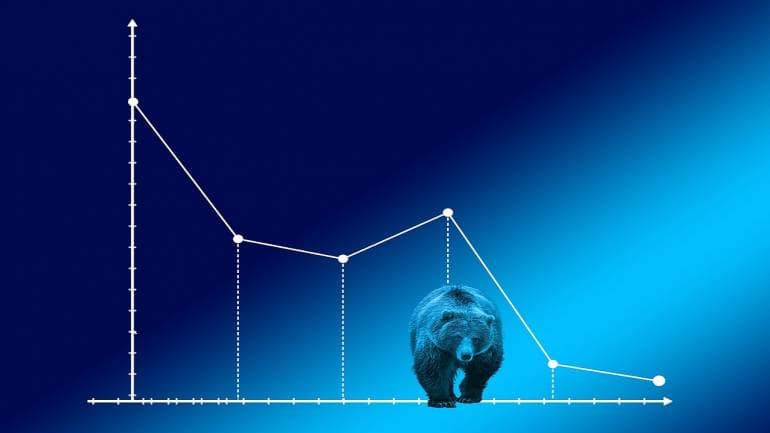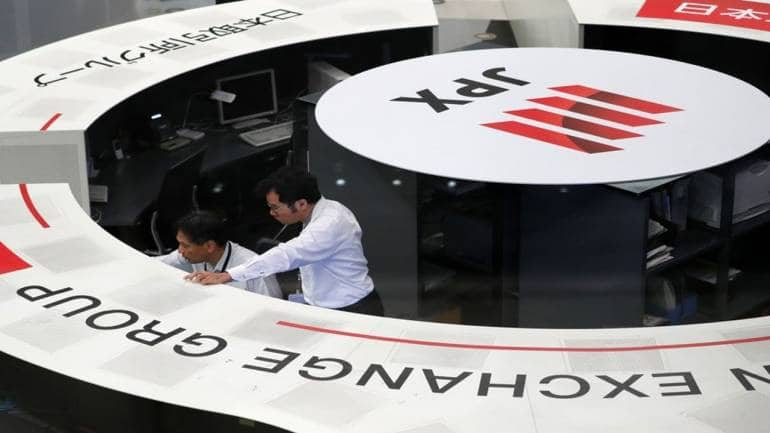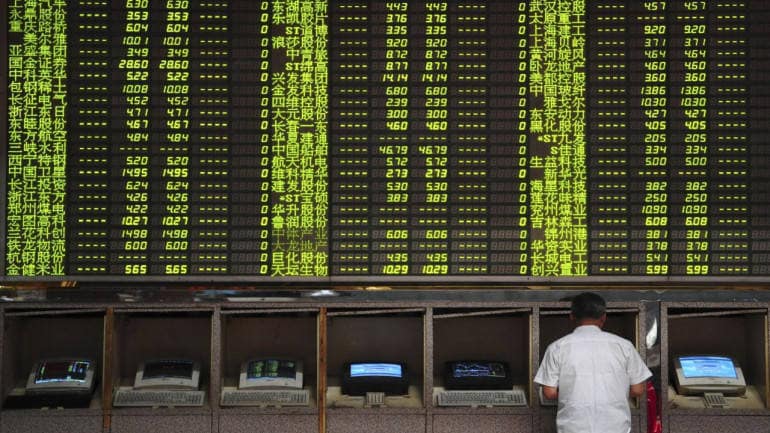Sensex, Nifty drop 1%; here are 4 factors behind the fall
 ]
]
Tracking weak global cues, the Indian equity market benchmarks the Sensex and the Nifty50 fell over a percent each on July 19.
The 30-share pack Sensex fell 734 points while Nifty plunged to 15,707.50 in intraday trade as investors fretted about rising inflation and incessant global spread of Delta variant of coronavirus.
At close, Sensex was 587 points, or 1.10 percent, down at 52,553.40 while the Nifty settled 171 points, or 1.07 percent, lower at 15,752.40.
Midcaps and smallcaps fared relatively better than their larger peers as the BSE Midcap index closed 0.58 percent lower while the smallcap index fell 0.31 percent.
Track Market Updates Here
Here are 4 factors that dragged the market lower
- Weak Asian cues: Indian market fell in sync with major Asian peers who were under pressure as investors avoided riskier equities and bought safe-haven assets such as gold amid concerns of rising inflation and a continuous surge in coronavirus cases.
Japan’s Nikkei, Hong Kong’s Hang Seng and Korea’s KOSPI fell over a percent each.
- Banking, financial stocks drag: Poor show of banking and financial heavyweights, such as HDFC twins, IndusInd Bank, ICICI Bank, Kotak Mahindra Bank, Axis Bank and SBI, pushed the equity benchmarks lower.
Banking and financial stocks came under fresh pressure after the June-quarter numbers of HDFC Bank failed to meet market expectations.
The bank on July 17 reported a 16.1 percent year-on-year growth in standalone profit at Rs 7,729.64 crore for the quarter ended June 2021 which was below market expectations as a CNBC-TV18 poll had estimated the numbers to the tune of Rs 7,995.9 crore.
Net interest income (NII), the difference between interest earned and interest expended, grew by 8.6 percent to Rs 17,009 crore but was below the CNBC-TV18 poll of Rs 17,698 crore.
As per CNBC-TV18, HDFC Bank’s net interest margin came in at 4.1 percent, an 18-quarter low.
The bank’s gross non-performing assets were at 1.47 percent of gross advances in Q1FY22, against 1.32 percent in Q4FY21, and net non-performing assets were at 0.48 percent against 0.40 percent.
Experts point out that the market appears to be disappointed with HDFC Bank’s number and the effect is spilling over other financial stocks too.
-
Relentless selling of FPIs: Foreign portfolio investors (FPIs) have been selling equities in July. As per data available with NSDL, FPIs have sold Indian equities worth Rs 4,515 crore in July so far. They have invested some money in the debt segment so net-net, they have pulled out Rs 1,517 crore from the Indian financial market in July so far.
-
Concerns over rich valuation: The market is trading near record-high levels which has raised concerns about rich valuations.
“Markets are likely to swing between ‘risk on’ & ‘risk off’ modes in the very short-term. Excessive valuations will persuade FIIs to sell consistently at higher levels,” said V K Vijayakumar, Chief Investment Strategist at Geojit Financial Services.
“The best safeguard in these uncertain times is to stick to high quality. Without a doubt, there is froth in the market. Froth getting removed is only a matter of time,” said Vijayakumar.
However, the risk of a sharp correction is feeble as retail investors continue with their buy on dips strategy whenever the market declines.
Technical view
The market opened a gap down, but the index still managed to stay above 15,700.
“The support is now upgraded from 15,400 to 15,600. As long as we do not break this on a closing basis, intraday dips or corrections can be utilised to accumulate long positions for a target of 16,000-16,100,” said Manish Hathiramani, Proprietary Index Trader and Technical Analyst, Deen Dayal Investments.
Disclaimer: MoneyControl is a part of the Network18 group. Network18 is controlled by Independent Media Trust, of which Reliance Industries is the sole beneficiary.
The views and investment tips expressed by investment experts on Moneycontrol.com are their own and not that of the website or its management. Moneycontrol.com advises users to check with certified experts before taking any investment decisions.
Asian shares up as US infrastructure bill lifts S&P to a record
 ]
]
Tokyo Stock Exchange
Asian shares rose on June 25, tracking gains on Wall Street overnight that lifted the Nasdaq and the S&P 500 indexes to record highs after United States President Joe Biden embraced a bipartisan Senate infrastructure deal.
Investors have been looking to an infrastructure agreement to extend the recovery in the world’s largest economy after massive fiscal stimulus helped the U.S. economy grow at a 6.4% annualized rate in the first quarter.
In morning trade, MSCI’s broadest index of Asia-Pacific shares outside Japan climbed 0.58%.
“The positive market tone recognizes the potential growth benefits of the compromise, but with the smaller size tempering some of the tax implications to pay for it,” said Kerry Craig, global market strategist at J.P. Morgan Asset Management.
Securing bipartisan agreement on the deal required Biden to sacrifice some of his original ambitions on schools, climate change mitigation, and support for parents and caregivers, as well as tax increases on the rich and corporations.
“We continue to expect progress on further fiscal stimulus in the months to come and the larger size of those packages will likely necessitate rising taxes, especially if they come via the U.S. Congressional budget reconciliation process rather than partisan support,” said Craig.
Chinese blue-chips rose 0.43%, Hong Kong’s Hang Seng added 0.61%, Seoul’s Kospi was up 0.79% and Australian shares climbed 0.22%. Japan’s Nikkei rose 0.59%.
Asian stocks rebounded after falling earlier in the week amid concerns of earlier-than-expected policy tightening by the U.S. Federal Reserve, after it signalled higher rates in 2023 last week.
“The reality remains that the timing of any tapering scare, or indeed tapering, is most likely to be driven by market-driven inflation expectations. And the pressure on this front has eased of late,” Christopher Wood, global head of equity strategy at Jefferies, said in a note.
Overnight, the S&P 500 gained 0.58% and the Nasdaq Composite added 0.69%, lifting both indexes to record high closes. The Dow Jones Industrial Average rose 0.95%.
In the currency market, the dollar index was down about 0.1% at 91.762 as investors continued to mull over the likelihood of Fed tightening in the face of persistent inflation.
The Japanese yen was slightly weaker at 110.90 and the euro edged up 0.08% to $1.1940.
Benchmark 10-year U.S. Treasuries, which saw yields dip after Biden’s announcement of an infrastructure bill were last at 1.497%, up from a close of 1.487% on Thursday.
Yields on the 30-year bond rose to 2.1062% from 2.095% on Thursday.
Oil prices climbed to near three-year highs, supported by drawdowns in U.S. inventories and accelerating German economic activity, with U.S. West Texas Intermediate crude rising 0.29% to $73.51 per barrel and global benchmark Brent crude at $75.77, up 0.28% on the day.
Spot gold was up 0.11% at $1,777.07 an ounce.
Asia opens higher, but China tech worries weigh on Hong Kong
 ]
]
Most Asian share markets opened a fraction higher on Tuesday, ahead of a key decision by Australia’s central bank on its quantitative easing programme and despite ongoing concerns over the future regulation of China’s powerful technology sector.
U.S. markets were closed on Monday to mark the Independence Day holiday, leaving the Asian region without a strong lead to start trading on Tuesday.
MSCI’s broadest index of Asia-Pacific shares outside Japan was up 0.05%.
In Hong Kong, the Hang Seng Index was down 0.7% while China’s CSI300 was off by nearly 0.3%.
Japan’s Nikkei was up 0.45% while the S&P ASX200 stood 0.21% higher. In South Korea, the Kospi 200 Index rose 0.5% in early trade.
Chinese technology stocks remain under the microscope on Tuesday after the Cyberspace Administration of China (CAC) ordered an investigation into Didi Global Holdings just days after it listed on the New York Stock Exchange.
“There is still lingering uncertainty from China’s tech companies and they are prominent in the Asian market, so that could be a cloud for market sentiment,” said Tai Hui, JPMorgan Assset Management chief Asia market strategist.
“The tech sector is very significant in Asia and we are not going to have a lot of clarity on the regulatory adjustments in China for the next few weeks or even months and (that) will be an important driver for the market.”
Investor appetite for Chinese tech companies could be tested by Xiaomi Corp mandating 12 banks on Tuesday to lead a potential U.S. dollar debt issuance.
In Australia, the prospect of more mergers and acquisitions activity is being scrutinised by investors after a $16.7 billion bid for Sydney Airport Holdings Ltd from a pension fund consortium emerged on Monday.
“Sentiment appears to have almost moved past the (economic) reopening trade and into outlook for corporate earnings that are coming up in August,” Karen Jorritsma, head of equities at RBC Capital Markets in Sydney told Reuters.
“Generally (earnings) ‘confession season’ has been remarkably good, and with balance sheets in such great shape the tide is turning to potential for M&A.”
Globally, the publication of the U.S. Federal Reserve’s Federal Open Markets Committee minutes for June on Wednesday is highly anticipated by investors for guidance on whether ongoing emergency stimulus measures could start to be tapered.
Major European markets were in positive territory overnight despite a jump in the Brent crude price to above $77 a barrel, the highest level since October 2018.
The spike came after OPEC+ ministers called of discussions on Monday after clashing last week when the United Arab Emirates rejected a proposed eight-month extension to output curbs, meaning no deal to boost production has been agreed.
There has been no date set for the next meeting of ministers of OPEC+ countries - the Organization of the Petroleum Exporting Countries (OPEC) and allied producers including Russia - but sources told Reuters new discussions could begin in the next few days.
Elevated oil prices are adding to concerns that a higher global inflation rate could derail the post-coronavirus pandemic recovery under way in some major world economies.
The Reserve Bank of Australia is expected to keep the official cash rate target on hold at 0.1%, but has flagged it will announce its decisions on the broader quantitative easing programme which is set to end in September.
Economists predict the RBA will limit its three-year bond yield target of 0.1% to the April-2024 bond, rather than extending it to the November-2024 bond.